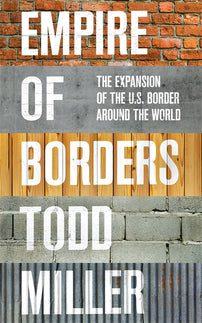5 Book Plan: The Politics of Borders
Todd Miller, author of Empire of Borders, selects five essential books about border imperialism, the surveillance state, and the politics of national security.

There is a huge foundation of journalism and scholarship from a variety of activists, journalists, and academics that shaped the ideas in Empire of Borders: The Expansion of the US Border around the World. Here I look at five books and two essays and the important points and arguments I derived from each of them.
Empire of Borders by Todd Miller is now 50% off as part of our Back to School sale.
Undoing Border Imperialism by Harsha Walia, (AK Press, 2013)
The central thesis of scholar-activist Harsha Walia’s excellent book Undoing Border Imperialism is crucial for Empire of Borders. You cannot read this book and even fathom that “border security” is protecting anybody. In fact the term is exposed as profoundly inaccurate–unless “border security” actually refers to the protection of a much bigger global system that facilitates, benefits, and favors capitalism and its companies and elites who profit, at the expense, displacement, and dispossession of impoverished and colonized communities throughout the world. As Walia writes, “Border controls are most severely deployed by those Western regimes that create mass displacement from, and are most severely deployed against those whose very recourse to migration results from the ravages of capital and military occupations,” which increasingly includes the climate crisis. But, Walia writes, “in order to rid ourselves of border imperialism along with the barriers we erect within ourselves against one another, our movements have to supplant the colonial and bordered logic of the state itself.” And how do we do this? Walia noted that more than a century ago anarchist Gustav Landauer asserted, “The state is a condition, a certain relationship between human beings, a mode of behavior; we destroy it by contracting other relationships.”
Violent Borders: Refugees and The Right to Move by Reece Jones, (Verso Books, 2017)
I don’t know if there’s a book I drew on more for Empire of Borders than Reece Jones’ book Violent Borders: Refugees and the Right to Move. And I don’t know if I’ve come across a book that connects concepts of private property and enclosure to the emergence of the nation-state so clearly. As Jones writes of 16th and 17th century Europe, just as capitalism was beginning to take hold, “lords began to enclose common fields and forests and convert them into bounded, owned, private properties.” Central to this land privatization was to limit the movement of people (and access to resources) into these places. As Jones deftly describes throughout his deeply-researched book, it was from this that we can trace the spawning of the nation-state, a relatively new development. And the process of enclosure became a part of the colonization of the world. One example of many was the 1884 Berlin Conference when the European powers sliced and divvied up Africa. These lines of division—that in a broader sense was not limited only to Africa, but spread across the Middle East, Asia, and Latin America—created by colonial and elite powers have become today’s international boundary lines. This is the genius of Jones’ book, the palpable physical brutality borders represent in today’s world—that he depicts vividly throughout the book—come directly from this historic injustice that is indelibly attached to colonialism and a colonial worldview. As with Undoing Border Imperialism, after reading Violent Borders, there is no possible way you can keep thinking of borders in the same way.
Boats, Borders, and Bases: Race, the Cold War, and the Rise of Migration Detention in the United States by Jenna M. Loyd and Alison Mountz, (University Of California Press, 2018)
The book Boats, Borders, and Bases, by geographers Jenna Loyd and Alison Mountz, was invaluable to me in terms of understanding the fundamental role U.S. Caribbean enforcement operations have played in the development of today’s U.S. border and deterrence regime. Loyd and Mountz note that both active and decommissioned U.S. military bases in Guam, Cuba, Panama, and Puerto Rico have become “material grounds of refugee and migration-control operations,” fusion centers of the U.S. security wars. Indeed, in Puerto Rico, I saw before my very eyes how a cold war military system via the Ramey Navy Base in Aguadilla had been replaced by a homeland security complex, which included the U.S. Border Patrol station behind coils of concertina wire where green striped vehicles were parked (the same vehicles I’m so used to seeing in southern Arizona). The colonial bases on these “’edges of American empire,” they write, provided the foundation for “building up today’s historically unprecedented detention, deportation, and border apparatus.” In this once-missing story of the U.S. trannsnational deterrence regime, Loyd and Mountz expertly situate Puerto Rico and the Caribbean into both the frontlines and into the deep history of the U.S. empire of borders.
Contraband Corridor: Making a Living at the Mexico-Guatemala Border by Rebecca Berke Galemba, (Stanford Press, 2017)
When anthropologist Rebecca Galemba quotes Elana Zilberg’s term “neoliberal security scape” she hits that part of a border regimes that is rarely talked about, that along with being a system of exclusion, the enforcement apparatus also securitizes business as usual. In Contraband Corridor by documenting the details of what it’s like to live on the Chiapan-Guatemalan divide in an ethnography based years of research, Galemba also details the border apparatus from a ground level like no other—and connects it to broader global dynamics. Galemba writes, “as neoliberal states rolled back their provision of services and supports for their populations, they have increasingly played the function of 'security providers for global capital.'" And global capital has long had its sights on Chiapas. As Zapatista subcommander Marcos wrote in 1992: “This land continues to pay tribute to the imperialists: petroleum, electricity, cattle, money, coffee, banana, honey, corn, cacao, tobacco, sugar, soy, melon, sorghum, mamey, mango, tamarind, avocado, and Chiapaneco blood all flow as a result of the thousand teeth sunk into the throat of the Mexican Southeast.” Galemba shows how the border apparatus fits into Mexico’s larger plans for such “regional development”: “...a heightened security and military presence in Chiapas creates a climate conducive to securing investment, resource extraction, and road construction that serves mega-development projects while silencing and criminalizing opposition and controlling mobility.” Indeed, the international regime of borders is also about armoring capitalism.
War Against the People: Israel, the Palestinians and Global Pacification by Jeff Halper (Pluto Press, 2015)
I know of no other book that links the Israeli creation of technology and construction of surveillance systems deployed in the Palestinian Occupied Territories with how they are deemed proven (combat proven, battle proven), and then sold in the broader world market. As Halper explains, this is much more than just about making money, it is about proliferating security systems to global ruling classes that “need” them in order to pacify people in an increasingly unsustainable world. In other words, while contexts vary widely from place to place, there is a global Israel and a global Palestine. Inequality between countries has skyrocketed in a short period of time. The ratio of GDP between the richest and poorest nations, Halper points out, went from a ratio of 22:1 at the beginning of the 20th century to 267:1 by the year 2000. In this situation, “the experience of the vast majority of people worldwide becomes one of impoverishment, marginality, exploitation, dislocation, and violence.” The security wars are not waged to secure individual nations, but to protect the international class of wealthy elites and the global system they represent. Without such an iron fist, there is no other way the yawning gaps of global inequalities can persist. Wars are no longer about the animosity between nation states, the new long war is rather “pacification in the name of enforcing the hegemony of transnational capital.” In other words, the wars on drugs, on terror, on immigrants have created never-ending battlescapes, often along borders, to insure the status quo.
The Right To The World by Joseph Nevins, Antipode 2017/ Why No Borders? by Nandita Sharma, Bridget Anderson, and Cynthia Wright, Refuge 2009
I finish with two essays. “The Right to the World” by geographer Joseph Nevins puts in place a compelling and logical argument that a “right to the world” needs to complement the “right to the city.” The right to the city originally comes from the French philosopher Henri Lefebvre who, to distill it into one sentence, calls for all people to be granted equal rights to resources and services in a city regardless of status. Nevins builds upon this by saying that two other concepts are also essential as we consider how people arrive to cities in the first place: a right to mobility worldwide, including to freely cross international borders, and a “just, sustainable share of the planet’s resources for all.”
In an important way, Nevins is arguing for a global commons that border scholars Nandita Sharma, Bridget Anderson, and Cynthia Wright also make the case for in their essay “Why No Borders?” The authors argue for a movement toward common land, toward a dissolution of borders, and, ultimately, toward shared resources—including basic natural resources such as air, habitable earth, and water—without the exclusionary boundaries around them. “A radical No Borders politics acknowledges that it is part of revolutionary change. It is ambitious and requires exciting and imaginative explorations, but it is not utopian. It is in fact eminently practical and is being carried out daily.”

